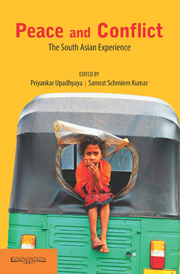Book contents
- Frontmatter
- Contents
- Foreword
- Preface
- Introduction
- 1 Conflict Resolution and Peacebuilding: Ideas, Approaches and Debates
- 2 Changing Perspectives on Peace Studies in South Asia
- 3 Peace Pedagogies in South Asia: Interreligious Understanding
- 4 Responses of Communities to Social Tension
- 5 Plurality of Peace, Non-violence and Peace Works in India
- 6 Education and Culture of Peace: Engaging with Gandhi
- 7 Structural Violence and Human Security: Gandhi's Visions
- 8 Women and the Peace Process in Nepal
- 9 Quest for Peace and Justice in Pakistan: Lawyers' Non-violent Resistance
- 10 Antinomies of Democracy and Peace in Nepal
- 11 Post-armed Conflict Trajectories in Sri Lanka
- 12 Environmental Security and Conflict in Bangladesh: Nature, Complexities and Policies
- Contributors
- Bibliography
- Index
10 - Antinomies of Democracy and Peace in Nepal
Published online by Cambridge University Press: 05 October 2014
- Frontmatter
- Contents
- Foreword
- Preface
- Introduction
- 1 Conflict Resolution and Peacebuilding: Ideas, Approaches and Debates
- 2 Changing Perspectives on Peace Studies in South Asia
- 3 Peace Pedagogies in South Asia: Interreligious Understanding
- 4 Responses of Communities to Social Tension
- 5 Plurality of Peace, Non-violence and Peace Works in India
- 6 Education and Culture of Peace: Engaging with Gandhi
- 7 Structural Violence and Human Security: Gandhi's Visions
- 8 Women and the Peace Process in Nepal
- 9 Quest for Peace and Justice in Pakistan: Lawyers' Non-violent Resistance
- 10 Antinomies of Democracy and Peace in Nepal
- 11 Post-armed Conflict Trajectories in Sri Lanka
- 12 Environmental Security and Conflict in Bangladesh: Nature, Complexities and Policies
- Contributors
- Bibliography
- Index
Summary
Introduction
Does the regime established on the basis of popular movement always contribute toward peacebuilding and strengthen the democratization process? If it does, what are the necessary ingredients for that? This chapter deals with the case of Nepal where frequent regime changes, by using so called popular movements, have paralysed the country. It appears that a practice has been established wherein every comfort, discomfort, approval, disapproval or breach of law either by the state or non-state agencies are being challenged through severe street protests. Many times these acts stand antinomies to democracy. Rise of various interest groups and non-state-actors, on the other hand, have further aggravated problems as their activities are maintaining permanent nature of revolutionary political culture with strategy of what Gramsci had called the movement of war manoeuvered. Professional political elites (political entrepreneurs), for their part, are found to have been exploiting state and its agencies in the name of democracy and peace. Such construction in political and social behaviour poses threat to political stability.
This chapter discusses the post-2006 politics and argues that regime change in Nepal has failed to work as per the spirit of popular movement which envisaged peaceful, prosperous, and politically stable Nepal. Ongoing political process, in contrast, is occupied by power politics where the agendas of ‘people’ at large are rarely discussed. Democracy, whose Nepali equivalent translation has now become loktantra (which used to be known by the name of prajatantra in the past) is reinforcing neo-patrimonial culture.
- Type
- Chapter
- Information
- Peace and ConflictThe South Asian Experience, pp. 177 - 199Publisher: Foundation BooksPrint publication year: 2014



